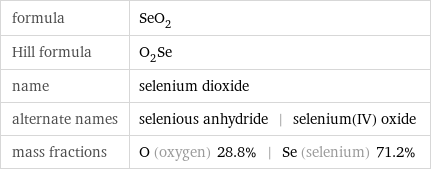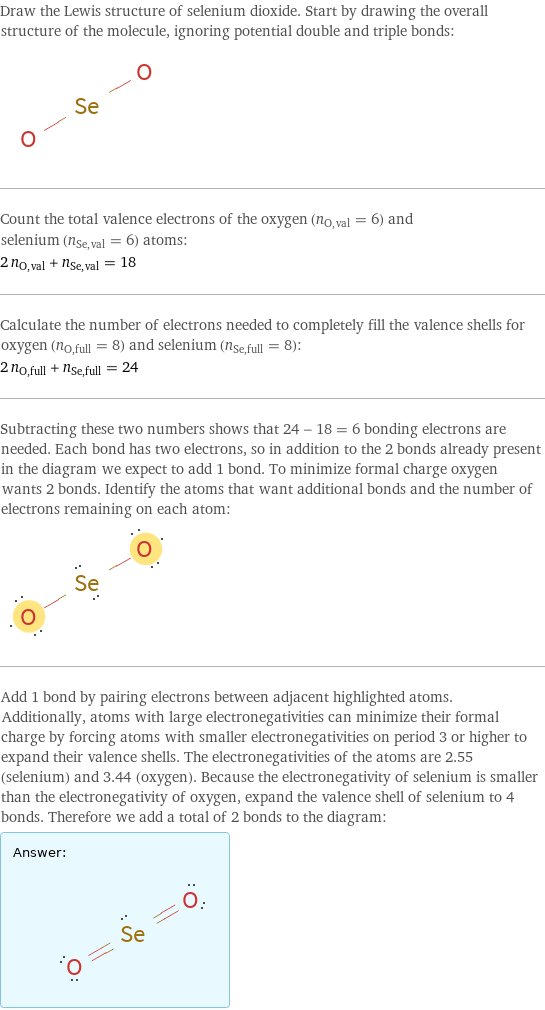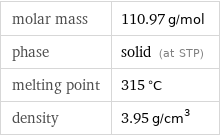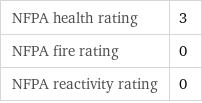Input interpretation

selenium dioxide
Chemical names and formulas

formula | SeO_2 Hill formula | O_2Se name | selenium dioxide alternate names | selenious anhydride | selenium(IV) oxide mass fractions | O (oxygen) 28.8% | Se (selenium) 71.2%
Lewis structure

Draw the Lewis structure of selenium dioxide. Start by drawing the overall structure of the molecule, ignoring potential double and triple bonds: Count the total valence electrons of the oxygen (n_O, val = 6) and selenium (n_Se, val = 6) atoms: 2 n_O, val + n_Se, val = 18 Calculate the number of electrons needed to completely fill the valence shells for oxygen (n_O, full = 8) and selenium (n_Se, full = 8): 2 n_O, full + n_Se, full = 24 Subtracting these two numbers shows that 24 - 18 = 6 bonding electrons are needed. Each bond has two electrons, so in addition to the 2 bonds already present in the diagram we expect to add 1 bond. To minimize formal charge oxygen wants 2 bonds. Identify the atoms that want additional bonds and the number of electrons remaining on each atom: Add 1 bond by pairing electrons between adjacent highlighted atoms. Additionally, atoms with large electronegativities can minimize their formal charge by forcing atoms with smaller electronegativities on period 3 or higher to expand their valence shells. The electronegativities of the atoms are 2.55 (selenium) and 3.44 (oxygen). Because the electronegativity of selenium is smaller than the electronegativity of oxygen, expand the valence shell of selenium to 4 bonds. Therefore we add a total of 2 bonds to the diagram: Answer: | |
3D structure

3D structure
Basic properties

molar mass | 110.97 g/mol phase | solid (at STP) melting point | 315 °C density | 3.95 g/cm^3
Units

Solid properties (at STP)

density | 3.95 g/cm^3 vapor pressure | 0.9998 mmHg
Units

Thermodynamic properties

molar heat of fusion | 17.6 kJ/mol specific heat of fusion | 0.159 kJ/g (at STP)
Chemical identifiers
![CAS number | 7446-08-4 PubChem CID number | 24007 PubChem SID number | 24851959 SMILES identifier | O=[Se]=O InChI identifier | InChI=1/O2Se/c1-3-2 RTECS number | VS8575000 MDL number | MFCD00003562](../image_source/e7e520f1441540cfd17b9a41a04619db.png)
CAS number | 7446-08-4 PubChem CID number | 24007 PubChem SID number | 24851959 SMILES identifier | O=[Se]=O InChI identifier | InChI=1/O2Se/c1-3-2 RTECS number | VS8575000 MDL number | MFCD00003562
NFPA label

NFPA label

NFPA health rating | 3 NFPA fire rating | 0 NFPA reactivity rating | 0
Toxicity properties

RTECS classes | mutagen | reproductive effector